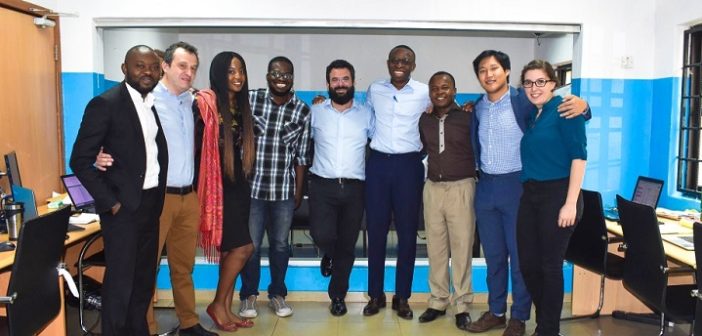
Salesforce Ventures made its inaugural investment in Latin America in RunaHR, a payroll automation platform, in a US$3.5m seed round that included Y Combinator, the founder of Gmail, CTO of Dropbox, executives of Rappi, Nubank, Cabify and WeWork Latin America, and HR experts including the CTO of Zenefits, former Head Sales Head of Gusto and former Product Manager of Gusto.
(Press Release) Mexico City, June 5, 2018. Runa, the platform automating payroll in Latin America, cuts the time it takes to manage payroll and HR in half for SMBs. Only 5 months after its launch, the Silicon Valley- and Mexico-based startup is experiencing rapid adoption in Mexico.
The idea was born when Courtney McColgan, founder of Runa, experienced the complexity around people management in Latin America during her previous position as CMO of Cabify. It was difficult for her to obtain key employee information, and ensure her team was being paid on-time and correctly. Even with a dedicated HR department, it was impossible due to the limited solutions available in the market.
The goal was to create a system that was always up to date and that automated everything – payroll, employee information, incidents, contracts and reports. Something would be as easy-to-use as Facebook and as accessible in price as Gmail.
“Existing payroll software in Latin America is not built for the SMB. It is extremely difficult to use, requires a lot of manual processing and is very expensive. Our platform allows users to automate everything and do so with a much more pleasant interface and a much more modern technology,” comments Courtney McColgan, CEO of Runa.
In April, Runa closed a seed round of financing of $3.5 million dollars. Notable investors include Y-Combinator, the founder of Gmail, the CTO of Dropbox, the CTO of Zenefits and the executives of the largest startups in Latin America: Rappi, Nubank, Cabify and WeWork Latin America. It is also the first startup in in all of Latin America in which Salesforce Ventures has invested.
“The Latin America market is gigantic. There are 17.5 million SMBs regionally and 4.5 million in our first market, Mexico, “Courtney said. “Even more important, the market is completely greenfield. Runa is the first business software into SMBs after Gmail and Microsoft Office, so you can imagine the possibilities as we expand our product offering over the next five years. “
Runa officially launched as part of the Y-Combinator Winter 2018 batch in January 2018. During the following 8 weeks, they grew 150% week after week reporting 56 companies and $256K ARR on demo day. Currently, Runa is growing at 50% month-over-month.
Read More >>>
PayJoy, a startup that has developed smartphone technology to facilitate access to credit in emerging markets, has raised $20 million from venture capital firm Greylock Partners, the company said on Thursday.
Union Square Ventures, EchoVC and Core Innovation Capital also participated in the round, PayJoy said. The San Francisco-based startup said it will use the funding to expand, secure more partners and develop new technologies.
PayJoy enables consumers with no bank accounts or formal credit history to purchase smartphones on installment payments and get cash loans. It does so by turning the smartphone into collateral through software that locks the phone when payments have not been made.
It believes that making smartphones more affordable can be a stepping stone toward increasing financial inclusion since more financial services are now being provided digitally.
“We’re building technology to help people carve a path into the financial system,” Mark Heynen, the company’s co-founder and chief business officer, said in an interview.
Globally, 1.7 billion adults do not have a bank account, but two-thirds of them own a mobile phone which could help them access financial services, the World Bank said in a 2018 report.
Josh McFarland, a partner at Greylock, said he believes PayJoy’s technology and distribution network could help emerging markets unlock some of their economic growth.
“Credit is a major piece of the infrastructure needed to help the global middle class better their quality of life,” McFarland said.
PayJoy, which employs around 90 people globally, operates in more than 10 countries including Mexico, India, Indonesia, Nigeria, Kenya and Guatemala. In most markets the startup does not provide financing itself, but partners with retailers and credit providers. Partners include Telefonica, Vodacom and Orange SA.
Read More >>>

Because this is America and we love cars and convenience, some banks offer drive-throughs, which typically come in one of three forms.
There’s the kind with a window and an actual human bank teller, the kind with an automated teller machine, and this reporter’s personal favorite: the pneumatic tubes. The whoosh of air, the satisfying thump of a capsule coming to a halt, a lollipop that comes with your transaction receipt because you lied and said there was a kid in the car. It’s all a delight.
Hyperloop is an open-source transportation technology built around that same tube and capsule concept. Except instead of checks and suckers, its capsules are scaled to carry people and freight.
And rather than using air pressure to propel capsules through a tube, Hyperloop’s design requires reducing intra-tube air pressure to a near vacuum. This reduces air resistance, which, in turn, means that capsules can hurtle down the tunnels at phenomenal speed: up to 600 miles per hour.
Virgin Hyperloop One is one of several companies working to commercialize the open-sourced specifications for hyperloop tech, which was originally published by a joint team of Tesla and SpaceX engineers in 2013. Somewhat unsurprisingly, it takes a lot of capital to get a mass transit infrastructure company off the ground, which is why Virgin Hyperloop One appears to be raising additional cash.
According to paperwork filed with the Securities and Exchange Commission (SEC) on Tuesday, Hyperloop Technologies, Inc. (doing business as “Virgin Hyperloop One”) disclosed its intent to raise nearly $225 million in new equity funding. The filing states that the company has already secured $172.2 million, leaving $52.5 million in the equity offering as-yet unsold. So far, 80 investors contributed to Virgin Hyperloop One’s round.
Read More >>>

Farmers markets have become a staple presence in many US cities, where there is a steady supply of smaller, often organic farmers and other food producers wanting a more direct channel to sell their goods, and a steady demand from foody types who like having the option of bypassing bigger grocery stores to amble around a group of stalls with a wider choice of items to cook and eat. Now, one of the startups that has turned that model into a profitable on-demand delivery business has raised some funding as it continues its expansion in the US, and beyond, en route to an IPO filing, potentially as soon as this year.
GrubMarket, which works with smaller farms and other suppliers to sell and deliver their items by way of its online store both to businesses — such as restaurants and stores of different sizes, as well as the plethora of food startups that prepare food for consumers — and consumers, has raised $25 million in an oversubscribed C1 round of funding (it was originally only going to be $15 million). (May 2019 update: ultimately the round actually closed at $28 million.)
The investment is being led by WI Harper Group and Digital Garage, with participation from other new investors Evolv Ventures, University Growth Fund, Arancia International Inc, CentreGold Capital and existing investors ACE & Company, GGV Capital, Fusion Fund, Bascom Ventures, along with other unnamed participants.
Mike Xu, GrubMarket’s CEO and founder, would not comment on its valuation, but starting from its earliest days as a member of the Winter 2015 cohort of Y Combinator, the startup has raised $89 million. And according to PitchBook figures — which we have confirmed with a close source are largely accurate — the pre-money valuation in this round was $230 million, which would put the post-money at around $255 million.
Xu said the company is currently operating on a $150 million annual run rate — versus $100 million when it raised $32 million nine months ago — and it continues to be profitable. Because of this, Xu said GrubMarket doesn’t need any working capital. It plans to use this $25 million instead to invest in more technology and acquisitions.
Read More>>>
Mollybox, a Shanghai, China-based pet food brand run by Xolo (Cayman) Limited, secured a total of $13m in its Series B financing round.
The round was co-led by DCM and Mars backed venture capital Digitalis, with participation from Unity Ventures, Digitalis Ventures, Seek Ventures, FJ Labs, Tekton Ventures, and Long Capital.
Led by Ju Yi, founder and CEO, Mollybox is a subscription-based service providing cat litter and food and sending to owners a “Surprise Box” every month filled with various kinds of cat snacks and nutrition products to explore new products.
The company has a total of 30,000 subscribers who are receiving its products.
A single box, its main product, contains staple food, snacks and toys. Users of the service can purchase monthly, quarterly and annual subscriptions.
In 2016, Mollybox received RMB 2 million in its angel round from Unity Ventures, and in 2017 landed RMB 4.2 million in pre-A round from Unity Ventures, Long Capital and Hexi Capital.
In January 2018, the company completed its Series A financing with $3.8 million investment from DCM, Atom Ventures and Unity Ventures.
Read More >>>

By Chalida Ekvitthayavechnukul
Memebox, a Korean online beauty marketplace startup, has closed a $35-million Series D round led by new strategic investor JJDC Inc, according to the company’s announcement last Thursday. This round marks the Korean startup’s first strategic investment and brings its total funding to $190 million. Memebox said that it will work with JJDC, the venture capital arm of Johnson & Johnson, to access the global market. “We want to build the next generation of personal care brands by leveraging Korean technology across beauty categories… We will leverage JJDC’s global capabilities and scientific expertise which will enable us to take a big step forward in our focus on innovation, R&D, and ultimately, reaching a global audience,” said Memebox founder and CEO Hyungseok Dino Ha.
Read More>>>

Mumbai-based ecommerce platform for buying and selling used cars, Truebil, has raised INR 100 Cr ($14 Mn) in a mix of equity and debt Series B funding round led by Japanese investor Joe Hirao, as the company plans to foray across five other Indian cities and strengthen its technology-based stack.
In the startup’s latest funding round, Kalaari Capital, Inventus Capital, Kae, Shunwei Capital, and Tekton had also participated, with Merisis Advisors as an investment banker.
With the latest funding, Paix Technology-owned Truebil has announced its total funding to have reached INR 160 Cr ($22.4 Mn). The company had announced revenue of INR 50 Cr ($7 Mn) for the FY 2017-18, and aims to generate 5x growth in revenue for the current fiscal.
Truebil was founded in March 2015 by Suraj Kalwani, Himanshu Singhal, Rakesh Raman, Ravi Chirania, Ritesh Pandey, Shanu Vivek, and Shubh Bansal. It offers an ample choice for its customers, providing a detailed report of each car to help them make informed purchase decisions.
Read More>>>

Outdoorsy is building for the road ahead. The three-year-old company, which connects customers with underused RVs and other trucks big enough to camp in overnight, just raised $50 million in Series C funding led by Greenspring Associates, with participation from earlier backers Aviva Ventures, Altos Ventures, AutoTech Ventures and Tandem Capital. That puts its total funding, in less than a year’s time, at $75 million. (We’d separately reported on its $25 million Series B round last February. It has now raised $81.5 million altogether.) It’s easy to understand why investors are excited about Outdoorsy, which moved its headquarters from the Bay Area to Austin six months ago, partly to get closer to its base of customers, as well as to take advantage of attractive tax incentives. The company is capitalizing on a global trend of millennials who want to stay overnight at places other than hotels, which can be pricey and based in commercial districts that can’t provide the same experience of staying in a neighborhood. Yet Outdoorsy is taking things a step further, so to speak. As co-founder and CEO Jeff Cavins notes, even with Airbnbs seemingly everywhere, there remain plenty of places where it makes even more sense to rent an RV and set up a grill, including at a beach, beside a lake or right outside events like musical festivals and car races. That’s saying nothing of traditional camping spots, like Yosemite and Yellowstone Valley. It’s easier than ever thanks largely to Outdoorsy, too, says Cavins. Earlier on, the company logged serious time with outfits like Aviva, a British insurance company that is not only an Outdoorsy investor at this point but which was convinced by Outdoorsy to create an insurance product expressly to cover RVs as distinct from more accident-prone vehicles with which they’ve long been lumped, like dune buggies.

LemonBox, a Chinese e-commerce startup that imports vitamins and health products from the U.S., has raised $2 million to develop its business.
The company graduated from Y Combinator’s most recent program in the U.S. and, fueled by the demo day, has pulled in the new capital from 10 investors, which include Partech, Tekton Ventures, Cathexis Ventures, Scrum Ventures and 122 West Ventures.
LemonBox started when co-founder and CEO Derek Weng, a former employee at Walmart in the U.S., saw an opportunity to organize the common practice of bringing health products back in China. Any Mainland Chinese person who has lived in, or even just visited, the U.S. will be familiar with such requests from family and friends, and LemonBox aims to make it possible for anyone in China to get U.S.-quality products without relying on a mule.
The service is primarily a WeChat app — which taps into China’s ubiquitous messaging platform — and a website, although Weng told TechCrunch in an interview this week that the company is contemplating a standalone app of its own. The benefit of that, beyond a potentially more engaging customer experience, could be to broaden LemonBox’s product selection and use data to offer a more customized selection of products. Related to that, LemonBox said it hopes to work with health and fitness-related services in the future to gather data, with permission, to help refine the personal approach.
Read More>>>

By
BTJ Logistics Pvt. Ltd, which runs tech-enabled logistics startup Freightwalla, has raised an undisclosed sum from venture capital firms Kae Capital and San Francisco-based Tekton Ventures, a company statement said.
The startup said it will use the capital to push sales, improve operations and to further develop its technology platform, the statement added.
Freightwalla was founded in 2016 by Sanjay Bhatia, a former PwC executive, Bharat Thanvi, a supply chain management executive, and Punit Java, a former Amazon and Microsoft executive.
The company offers enterprises a technology-based platform to plan, book and manage their international freight shipments online.
“By offering our services as a technology-enabled forwarder, we are able to transform the experience for our customers at every step of the process, from planning shipments, to automating document workflows and providing key insights into their operations. We have been able to cut down the time involved in planning shipments by up to 80% whilst saving an average of 20% on the cost of a shipment to our clients,” said Bhatia in the statement.
Read More>>>

South Korea has its fourth unicorn startup after Viva Republica, the company beyond popular payment app Toss, announced it has raised an $80 million round at a valuation of $1.2 billion.
This new round is led by U.S. firms Kleiner Perkins and Ribbit Capital, both of which cut their first checks for Korea with this deal. Others participating include existing investors Altos Ventures, Bessemer Venture Partners, Goodwater Capital, KTB Network, Novel, PayPal and Qualcomm Ventures. The deal comes just six months after Viva Republica raised $40 million to accelerate growth, and it takes the company to nearly $200 million raised from investors to date.
Toss was started in 2015 by former dentist SG Lee who grew frustrated by the cumbersome way online payments worked in Korea. Despite the fact that the country has one of the highest smartphone penetration rates in the world and is a top user of credit cards, the process required more than a dozen steps and came with limits.
“Before Toss, users required five passwords and around 37 clicks to transfer $10. With Toss users need just one password and three steps to transfer up to KRW 500,000 ($430),” Lee said in a past statement.

Nigerian fintech startup Lidya has raised US$6.9 million in a Series A investment round led by Omidyar Network to allow it to expand its loan book, scale across Nigeria and Africa, and grow its team.
Launched in 2016, Lidya is a digital financial services platform focused on improving access to credit for micro, small, and medium-sized enterprises (MSMEs) in Africa.
Since its launch, it has made over 1,500 business loans to help MSMEs in farming, hospitality, logistics, retail, real estate, technology, and health get the capital they need to grow their operations.
Having raised US$1.25 million in funding in March of last year, Lidya has now secured a US$6.9 million round led by Omidyar Network, the Silicon Valley impact investment firm established by eBay founder Pierre Omidyar. New investors Alitheia Capital (via the Umunthu Fund), Bamboo Capital Partners, and Tekton Ventures, also joined the round, which included existing investors Accion Venture Lab and Newid Capital.
Read More>>>
by Connie Loizos (@cookie)
According to serial entrepreneur Jeff Cavins, more than 35 million people each year look to rent an RV — 38 percent of them so-called millennials. Yet they often walk away from the experience empty-handed. The reason, he says: There are fewer than 100,000 commercially owned vehicles available from traditional rental services.
Cavins says that his San Francisco-based company, Outdoorsy, is beginning to address this issue by enabling owners of the 14 million privately owned RVs in the United States to rent them to users, à la Airbnb.
The vehicles are mostly sitting around collecting dust anyway, says Cavins, who co-founded the company in late 2014 after heading up seven previous companies — two of which were publicly traded.
Read More >>>
The financial services industry is facing a wave of digital disruption that is starting to reshape the sector. The Fintech 100 celebrates the top companies this bold new space: the 50 leading established players creating change within financial services, and 50 of the emerging fintech stars of tomorrow. The Fintech 100 offers an in-depth view of the most exciting startups and organisations taking advantage of technology to revolutionise the industry. The report is a collaborative effort between H2 Ventures and KPMG.
Read More–>>
Love Bitcoin or hate it, Wall Street’s establishment increasingly wants to trade it.
On Tuesday, CME Group
Later this quarter, CME will begin trading Bitcoin futures by way of a cash-settled contract based on its CME CF Bitcoin Reference Rate. The once-a-day rate will set the price of bitcoin futures and will be based on pricing seen on crypto exchanges such as Bitstamp, DGAX, itBit and Kraken.
Read More–>>
CHICAGO, 31 OCTOBER 201 /CME GROUP/ — CME Group, the world’s leading and most diverse derivatives marketplace, today announced it intends to launch bitcoin futures in the fourth quarter of 2017, pending all relevant regulatory review periods.
The new contract will be cash-settled, based on the CME CF Bitcoin Reference Rate (BRR) which serves as a once-a-day reference rate of the U.S. dollar price of bitcoin. Bitcoin futures will be listed on and subject to the rules of CME.
“Given increasing client interest in the evolving cryptocurrency markets, we have decided to introduce a bitcoin futures contract,” said Terry Duffy, CME Group Chairman and Chief Executive Officer. “As the world’s largest regulated FX marketplace, CME Group is the natural home for this new vehicle that will provide investors with transparency, price discovery and risk transfer capabilities.”
Read More–>>

May Mobility is a startup making its official debut at Y Combinator’s demo day on Monday, focused on offering autonomous driving technology that companies with commercial fleets will be able to use in the near-term, not a decade from now. But the startup, while young, actually has a decade of experience, thanks to a team that’s been working on autonomous tech since the third DARPA Grand Challenge in 2007.
May Mobility is led by CEO and co-founder Edwin Olson, who used to act as lead investigator on Ford’s autonomous driving program. Olson was also a co-director focused on autonomous driving at Toyota Research Institute, which houses some of the top minds in the world in robotics, and is taking a leave from his current role as an Associate Professor of Computer Science at the University of Michigan to build May.
Read more–>>
View Video–>>
But VCs aren’t giving up on the dream of getting food delivered cheaply through an app. They’re just trying to find ways to do so with fewer subsidies, or even profitably. One promising niche is targeting the hungry office worker. Investors recently put $30 million into Eat Club Inc., which delivers premade lunches in the San Francisco Bay area and Los Angeles. The company, which said it’s profitable, plans to use the money for an expansion to New York.
Eat Club offers similar options to Munchery or Sprig, with about 20 entrées per day, but only delivers to offices with 20 or more employees. Workers can order from an app or website. By delivering an office’s meals together, the company estimates it costs 90 percent less per dish compared with on-demand startups. Eat Club said its couriers drop off 20,000 meals a day, mainly to midsized technology companies such as Flipboard. Eat Club declined to say how many corporate customers have signed up but said it expects to generate $50 million in revenue this year.
Read more–>
EAT Club, the fastest-growing provider of corporate lunch programs, announced today that it raised a $30 million Series C round, led by a strategic investor, Sodexo, the worldwide leader in Quality of Life Services, with participation from existing investors August Capital and Trinity Ventures. The $30 million investment will fund expansion to New York City and broaden the company’s existing footprint in the San Francisco Bay Area and Los Angeles.
EAT Club is a Silicon Valley startup that is revolutionizing the way people eat at the office at thousands of companies in California today. The company sets itself apart from the overcrowded food delivery segment with a unique logistics model driven by its own proprietary technology, providing offices with individually selected employee meals at scale. Today, EAT Club serves tens of thousands of individual meals per day with a 99.7% on-time delivery rate, and is generating a profit with healthy contribution margins, a measure of success others have not been able to achieve in this large and growing segment.
Read more–>
